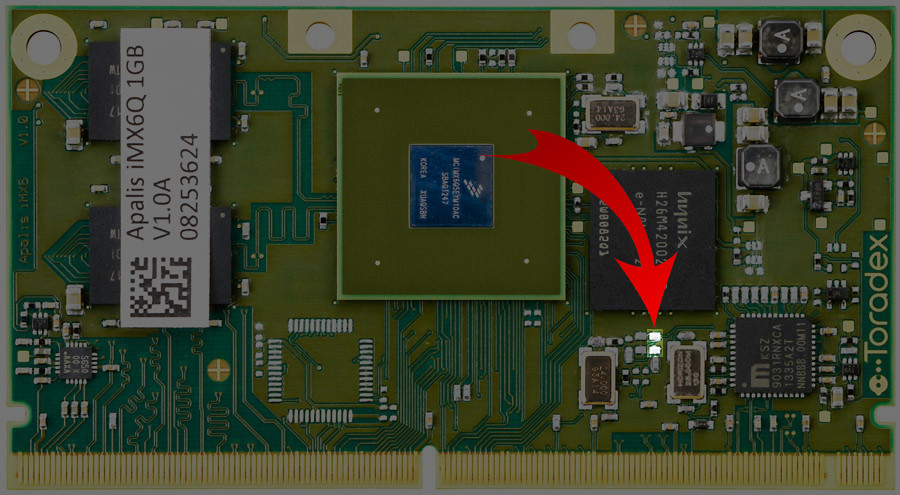@alex.tx thank your for details explaining.
Running recovery-windows.bat without shorting SOM pads launches uboot, and loaded tezi.itb. I do not understand how recovery-windows.bat automatically loaded uboot over the OTG port. Magic.
On debug serial terminal, the boot is stuck in a loop “A start job is running for /dev/mmcblk1p1”, and “A start job is running for /dev/mmcblk1p2”. This was after I reinstalled my yocto built image using TEZI from USB stick.
Start job boot loop:
Industrial temperature grade DDR3 timings.
Trying to boot from MMC1
U-Boot 2019.07-0+git.b90d461f8277 (Nov 03 2022 - 15:11:47 +0000)
CPU: Freescale i.MX6D rev1.5 at 792MHz
CPU: Industrial temperature grade (-40C to 105C) at 38C
Reset cause: POR
DRAM: 1 GiB
PMIC: device id: 0x10, revision id: 0x21, programmed
MMC: FSL_SDHC: 1, FSL_SDHC: 2, FSL_SDHC: 0
Loading Environment from MMC... *** Warning - bad CRC, using default environment
Display: wvga-lvds (800x480)
In: serial
Out: serial
Err: serial
Model: Toradex Apalis iMX6 Dual 1GB IT V1.1B, Serial# 05212386
Net: using PHY at 7
FEC [PRIME]
Hit any key to stop autoboot: 0
MMC: no card present
Card did not respond to voltage select!
switch to partitions #0, OK
mmc0(part 0) is current device
Scanning mmc 0:1...
Found U-Boot script /boot.scr
1836 bytes read in 23 ms (77.1 KiB/s)
## Executing script at 17000000
Setting bus to 0
Error writing the chip: -121
Setting bus to 0
Valid chip addresses:
81335 bytes read in 21 ms (3.7 MiB/s)
14 bytes read in 11 ms (1000 Bytes/s)
5403248 bytes read in 206 ms (25 MiB/s)
## Flattened Device Tree blob at 12100000
Booting using the fdt blob at 0x12100000
Using Device Tree in place at 12100000, end 12136fff
Starting kernel ...
[ 0.099752] pca953x 1-0070: failed reading register
[ 0.324849] fxl6408 1-0044: FXL6408 probe returned DID: 0xfa
[ 0.525253] fxos8700 3-001f: read chip ID 0x1 is not equal to 0xc7 or 0xc4
[ 0.612831] sbs-battery 1-000b: sbs_probe: Failed to get device status
[ 0.814750] leds_pwm pwmleds: unable to request PWM for blue:led1: -22
[ 1.003394] fsl-hdmi-dai soc:hdmi_audio@00120000: failed to probe. Load HDMI-video first.
[ 1.026491] imx-audio-hdmi sound-hdmi: initialize HDMI-audio failed. load HDMI-video first!
[ 1.948721] BT: Loading driver
[ 2.083744] BT Request firmware: nxp/emmy-w1-sdio/sd8887_uapsta_a2.bin
[ 3.244235] BT: FW download over, size 632896 bytes
[ 3.949889] BT FW is active(3)
[ 4.079152] BT: Driver loaded successfully
[ 4.121371] BT: Loading driver
[ 4.164648] BT: Cannot create proc interface
[ 4.193998] kobject_add_internal failed for bt_fm_nfc with -EEXIST, don't try to register things with the same name in the same directory.
[ 4.206537] Unable to allocate class
[ 4.210610] BT: Driver loading failed
[ 4.371766] wlan: Loading MWLAN driver
[ 4.456373] vendor=0x02DF device=0x9135 class=0 function=1
[ 4.483454] SDIO: max_segs=128 max_seg_size=65535
[ 4.488176] rx_work=1 cpu_num=2
[ 4.583192] Request firmware: nxp/emmy-w1-sdio/sd8887_uapsta_a2.bin
[ 4.614538] WLAN FW is active
[ 4.639830] Trying download country_power_tble: nxp/emmy-w1-sdio/rgpower_00.bin
[ 4.718807] wlan: version = SD8887-15.68.19.p47-C4X15C680-GPL-(FP68)
[ 4.739823] wlan: Driver loaded successfully
[.[0m.[0;31m* .[0m] (1 of 2) A start job is running for /dev/mmcblk1p2 (8s / 1min 30s)
.M
.[K[.[0;1;31m*.[0m.[0;31m* .[0m] (1 of 2) A start job is running for /dev/mmcblk1p2 (9s / 1min 30s)
.M
.[K[.[0;31m*.[0;1;31m*.[0m.[0;31m* .[0m] (1 of 2) A start job is running for /dev/mmcblk1p2 (10s / 1min 30s)
.M
.[K[ .[0;31m*.[0;1;31m*.[0m.[0;31m* .[0m] (2 of 2) A start job is running for /dev/mmcblk1p1 (10s / 1min 30s)
.M
.[K[ .[0;31m*.[0;1;31m*.[0m.[0;31m* .[0m] (2 of 2) A start job is running for /dev/mmcblk1p1 (11s / 1min 30s)
.M
.[K[ .[0;31m*.[0;1;31m*.[0m.[0;31m*.[0m] (2 of 2) A start
@hfranco.tx said only tar files are accepted by Toradex Easy Installer
I should convert all of these *.tar.xz and *tar.gz files in my releases/usb folder into raw uncompressed *.tar format in order for Easy Installer to work properly?
├── hddme-image-apalis-imx6-hddme1-20221103202356-Tezi_3.0.4
│ ├── hddme-image-apalis-imx6-hddme1.bootfs.tar.xz
│ ├── hddme-image-apalis-imx6-hddme1.dataimg.tar.gz
│ ├── hddme-image-apalis-imx6-hddme1.tar.xz
And then modify the image.json *.tar.xz to *.tar ?
~/hddme_image/releases/usb/hddme-image-apalis-imx6-hddme1-20221103202356-Tezi_3.0.4/image.json
{
"config_format": 2,
"autoinstall": false,
"name": "HDDME Image",
"description": "HDDME Image.",
"version": "Qt 5.15.6",
"release_date": "2022-11-03",
"u_boot_env": "uEnv.txt",
"prepare_script": "prepare.sh",
"wrapup_script": "wrapup.sh",
"marketing": "marketing.tar",
"license_title": "END USER LICENSE AGREEMENT",
"license": "TEZI_EULA.TXT",
"icon": "hddme.png",
"supported_product_ids": [
"0027",
"0028",
"0029",
"0035"
],
"blockdevs": [
{
"name": "mmcblk0",
"partitions": [
{
"partition_size_nominal": 24,
"want_maximised": false,
"content": {
"label": "BOOT",
"filesystem_type": "FAT",
"mkfs_options": "",
"filename": "hddme-image-apalis-imx6-hddme1.bootfs.tar.xz",
"uncompressed_size": 5.8515625
}
},
{
"partition_size_nominal": 512,
"want_maximised": true,
"content": {
"label": "RFSA",
"filesystem_type": "ext4",
"mkfs_options": "-E nodiscard",
"filename": "hddme-image-apalis-imx6-hddme1.tar.xz",
"uncompressed_size": 1277.6328125
}
},
{
"partition_size_nominal": 512,
"want_maximised": true,
"content": {
"label": "RFSB",
"filesystem_type": "ext4",
"mkfs_options": "-E nodiscard",
"filename": "hddme-image-apalis-imx6-hddme1.tar.xz",
"uncompressed_size": 1277.6328125
}
},
{
"partition_size_nominal": "128",
"want_maximised": false,
"content": {
"label": "DATA",
"filesystem_type": "ext4",
"mkfs_options": "-E nodiscard",
"filename": "hddme-image-apalis-imx6-hddme1.dataimg.tar.xz",
"uncompressed_size": 1277.6328125
}
}
]
},
{
"name": "mmcblk0boot0",
"erase": true,
"content": {
"filesystem_type": "raw",
"rawfiles": [
{
"filename": "SPL",
"dd_options": "seek=2"
},
{
"filename": "u-boot.img",
"dd_options": "seek=138"
}
]
}
}
]
}
Thank you,
-Ed

